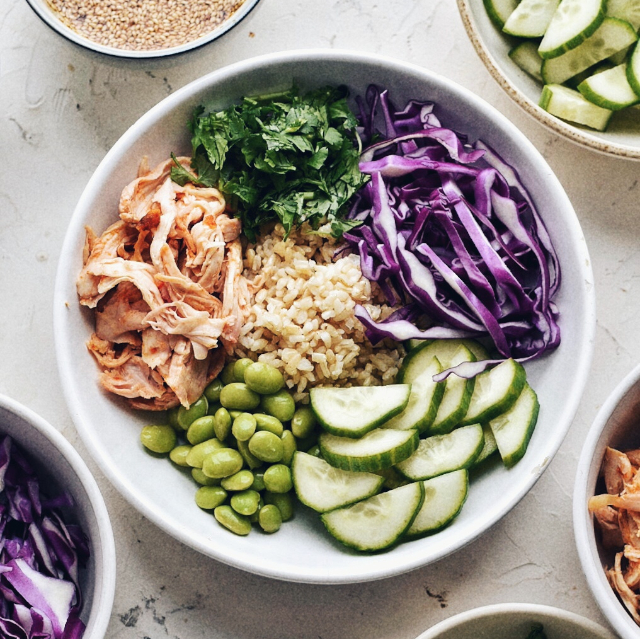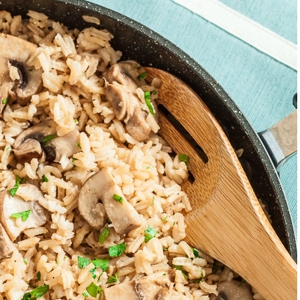Japanese researchers say restricting the amount of protein we consume may help us live longer, healthier lives. The idea really does make sense when you consider who’s eating what in various parts of the world today…
 The way of the future? Classic Asian Rice Bowl: With crispy, crunchy raw veggies and leafy
The way of the future? Classic Asian Rice Bowl: With crispy, crunchy raw veggies and leafy
greens edamame beans, and a small portion of animal protein on a generous bed of rice.
The basic idea
Okay. It’s just at the earliest – lab mouse – stage. But researchers had already noted, “Optimal nutrition according to age can help maintain metabolic health, thereby improving the health span (period of life without diseases) and lifespan of an individual. […] However, the amount of protein that must be consumed to maintain metabolic health is not known.” Now, they wanted to know the specifics.
What they did
A team of researchers led by Assistant Professor Yoshitaka Kondo from Waseda University, Japan, investigated the amount of dietary protein needed to improve metabolic health in mice approaching old age.
They recruited young (6 months old) and middle-aged (16 months old) male mice who were fed diets with varying protein content (5 to 45 percent) for two months. After two months, the effect of varying protein diets was assessed based on measurements of skeletal muscle weight, liver and blood fat profiles, and plasma amino acid profiles. Sounds complicated, but the gist of it is, the team wanted to see how varying levels of protein intake effected metabolism.
Kondo explained, “[We thought] the optimal balance of macronutrients for ideal health outcomes may vary across different life stages.”
What they found
According to an abstract of the study findings: “The team observed that the consumption of a low-protein diet led to the development of mild fatty liver, with increased levels of hepatic lipids in middle-aged mice as compared to young mice. In contrast, a moderate-protein diet led to reduced blood glucose concentrations and lipid levels in both liver and plasma. These findings indicate that a moderate-protein diet (between 25 percent and 35 percent) kept both young and middle-aged mice metabolically healthier.”
The takeaway
Kondo remarks, “Protein requirements change through the course of life, being higher in younger reproductive mice, reducing through middle age, and rising again in older mice as protein efficiency declines. The same pattern is likely to be observed in humans. Therefore, it could be assumed that increasing daily protein intake in meals could promote metabolic health of people. Moreover, ideal dietary macronutrient balance at each life stage could also extend health span.”
My take
As I said at the top of this post, the Japanese team’s findings do make sense. Cultures whose diets veer toward lower protein content and higher proportions of whole grains and vegetables seem to enjoy healthier old age. Look, for instance, at the Asian diets. Rice, legumes, tofu and other, veggie protein sources largely take the place of animal proteins. And, perhaps most importantly, Asian diners usually arrange their dinner bowls with a large proportion of veggies and a small amount of meat.
You might say that Kondo’s team didn’t really ‘discover’ that moderate protein intake in early and middle age can give us a longer, healthier life – they just confirmed it. Or would you?
Muse on that…
~ Maggie J.

